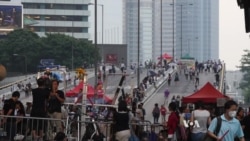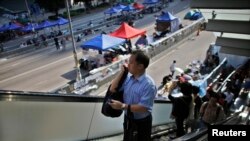As the pro-democracy occupation in Hong Kong stretches into a second week, authorities have agreed to discuss the protesters' basic demands on the constitution, the Basic Law. Democratic Party founder Martin Lee said the government is violating the law under pressure from Beijing.
Hong Kong's democracy demonstrators are smaller in number than during previous days, and they lifted blockades allowing civil servants to resume work. They are determined to occupy central parts of the city, though, until their demands for genuine elections are met.
Authorities backed off threats to use force and Democratic Party founder Martin Lee said violence is not likely.
“I don't see the Tiananmen Square scenario being re-enacted in Hong Kong. I don't see that happening," said Lee. "I don't think the present regime would like to see that happen and there's no need to do that. Because back in 1989 the communist party was worried that it might be overthrown. But, there's no such fear today in Hong Kong, particularly when the demonstrators have all acted with love and peace.”
Scenes of tear gas and attacks by those opposed to the occupation have been replaced by occasional emotional clashes. In a breakthrough on the stand-off, government and student leaders agreed to direct talks on Hong Kong's constitution, the Basic Law.
Legal violation
The law is violated by Beijing's efforts to prevent Hong Kong people from directly choosing their leader, according to Lee.
“Beijing delayed it twice. Each time five years," he said. "And now finally when we thought that we would have genuine democracy for the election of the chief executive in 2017, Beijing now wants to move the goal posts and say 'ok, you can have one person one vote but we choose all the candidates for you.'”
But the talks between the protesters and Hong Kong government are a good sign, said Lee.
“Well, if there is good will, particularly on the side of the government, then this could possibly end beautifully. But, again, Beijing holds all the cards,” he said.
Analysts say Beijing is not likely to give in to the demands out of fear that a confrontational leader could be chosen, or that mainland Chinese also would demand to elect their own leaders.






